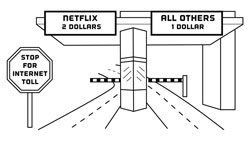The Federal Communications Commission (FCC) controversial decision to pass new “net neutrality” regulations on Feb. 26 is being argued and legal battles and legislative disputes are about to begin over this emerging phenomenon that has been brewing since 2010. The FCC’s original attempt at broader internet regulation was struck down by Federal courts but they are now revamping their argument under Title II of the Communications Act of 1934, which they claim makes the Internet a “Public Utility.” But first off, what is “Net Neutrality” and why is it important?
Net neutrality is the internet open and without regulation. The FCC is trying to regulate it to prevent speed traps to certain websites. According to CNN, this could speed up access to certain websites, slow down access to others, and block others entirely. Companies that deliver Internet access like Verizon, Comcast, and AT&T have spent millions of dollars on lobbying against these rules because they claim that micromanagement by the government would hurt their business and their consumers. On the opposing side, giant Internet Corporations like Google, Facebook, and Netflix are in favor of this legislation argue that the Internet is a public entity and should be regulated as such.
Assistant professor of criminal justice, John Comiskey, said, “This legislation seems to be concerned more about businesses trying to establish and maintain monopoly.” He also added that the Internet is an “information highway” and “getting information before others is an advantage.”
The pro-FCC regulation side, which includes AOL, Netflix, Facebook, Twitter and other big internet companies, argue that they do not want to face discrimination from the big internet providers. For example, a big network provider like Comcast, Verizon, and AT&T can slow down internet apps on smart phones that come from these pro-regulation companies. Dr. Patrick O’Halloran, associate professor of economics, finance and real estate, said, “They would support Net Neutrality since they are not in the business of bandwidth provider, so the more people accessing their sites the better.”
The anti- regulation companies which include Verizon, Comcast, Time Warner Cable, and AT&T argue that the act in which the FCC is presenting their case under, Title II of the Communications Act of 1934, does not apply to the services that they provide. They also do not trust that the FCC will only enforce a fraction of the rules that they are presenting that include 332 pages of regulations, according to CNN. O’Hallaran said, “Net neutrality limits their ability to price discriminate. Price discrimination increases revenue generation, hence improving profits at the consumers’ expense. Therefore, if Net Neutrality were to be revoked, it would allow service providers such as Comcast to create pay-to-play fast lanes.” They also think that these rules would interfere with the free market of the Internet and hurt competition.
Comcast and AT&T are threatening that there will be a bitter legal battle. This is very similar to the FCC’s last attempt at Internet regulation where they were sued by Verizon and lost in Federal court. Republicans are also seeking to call the FCC chairman, Tom Wheeler, to review these regulations in front of Congress, which they hold the majority. However, the real challenge to these proposed rules will be in the courts as it was last time.
Gregory Bordelon, lecturer of political science, said, “As to the FCC chairman going before Congress that would depend on the reason for the request for his presence. If Congress is simply trying to determine why this rule got passed in the normal rulemaking process of the FCC, nothing will likely develop. The more likely challenge, as many analyze, will be a court challenge.” Bordelon also stated that the opposition can find ways in which the FCC has overstepped its boundaries and that could be another way in which the rules can be struck down. He said, “The fear, of course, is that by regulating that aspect of it, the FCC may be affecting other components of the Internet, including expression and discourse. This is where the free speech argument comes in. The FCC would simply argue that the rules allow it to classify the Internet as a public utility under existing law; the opponents would say no – that the intent of the statute was not to regulate a communication device like the Internet and that its functional difference from the telephone takes it outside the scope of Section II.”
The fight over the FCC’s new regulations are far from over. Outside of the United States own legislative system, the idea of Internet regulation would take a broad international alliance. Comiskey said, “The U.S. does not own the Internet and cannot regulate it by itself. This is still an emerging, evolving phenomenon and is not definitive.”
IMAGE TAKEN from amazonaws.com


